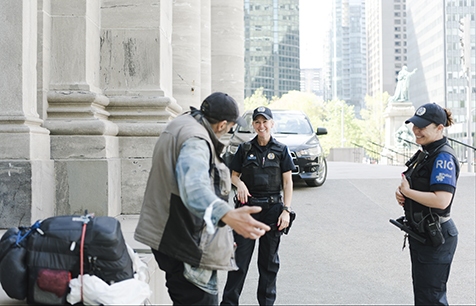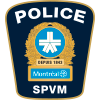
Division de la prévention et de la sécurité urbaine
At the Service de police de la Ville de Montréal (SPVM), the Division de la prévention et de la sécurité urbaine (DPSU) is the corporate unit responsible for the vision and organizational coherence related to prevention, adjustment of practices to social problems and community relations. Its actions support the various units, including the neighbourhood police stations (PDQ).
Staff dedicated to prevention
The DPSU is made up of 80 officers and civilian staff who work full-time in prevention and community relations.
Its staff coordinate and propose corporate orientations and priorities based on the changing trends, needs and expectations of the citizens of Montréal.
Firstly, commanders and consulting officers are assigned to social issues at the DPSU, such as domestic and intrafamily violence, mental health, homelessness, sexual exploitation, elder abuse and youth interventions.
Specialized expertise: EMRII, ESUP and Patrouilles conjointes autochtones
Secondly, the Division is comprised of specialized mixed teams combining police officers and service workers from the CIUSSS du Centre-Sud-de-l’Île-de-Montréal such as the Équipe mobile de référence et d’intervention en itinérance (EMRII) and the Équipe de soutien aux urgences psychosociales (ESUP); or Patrouilles conjointes autochtones, carried out in collaboration with the Centre d'amitié autochtone de Montréal.
The partnership with service workers at the EMRII, the ESUP or Patrouilles conjointes autochtones helps the SPVM offer services to people in vulnerable situations, wherever they are, and facilitate their access to the health, social services and community network.
The power of partnerships
In fact, this partnership enables better concerted action within the scope of the expertise, mandates and limits of the various players. It helps reduce the number of repeat interventions with the same people and indirectly reduces tensions resulting from coexistence problems. These teams are a great example of the integration of police practices in a continuum of multi-sectoral services.
Dealing with people in vulnerable situations requires numerous steps and alignment by police officers, with the health and social services, the justice system and the community environment. Thus, the work by the EMRII, the ESUP and Patrouilles conjointes autochtones reduces the time spent by frontline patrol officers on these interventions, who respond to emergency calls and serve the population as a whole.
To find out more:
Équipe de soutien aux urgences psychosociales - ESUP (english)
Équipe mobile de référence et d’intervention en itinérance - EMRII (english)
Patrouilles conjointes autochtones (english)
Specialized investigation units: MICH and SSVC
Module des incidents et des crimes haineux (MICH)
In the DPSU’s ranks, police officers are also assigned to the Module des incidents et des crimes haineux. This module was created from a joint desire by the SPVM and the Ville de Montréal to develop a specialized unit to exclusively handle hate incidents and crimes across Montréal. In Québec, the SPVM is one of the rare police forces to handle hate incidents. By applying its innovative and unique approach, the MICH handles these incidents to prevent them from turning into hate crimes.
Created to respond to several challenges, including discrimination and polarization of ideas, the module operates transversally. For example, the module investigates hate speech, takes action against individuals spreading hate speech, but also intervenes in conjunction with partners, family and friends, and the targeted population whose sense of safety is impacted. Recognizing the rise in hate speech on social networks, the MICH also carries out numerous investigations relating to criminal and non-criminal speech online. This module has expertise in relation to the spectrum of freedom of speech on social media.
Section spécialisée en violence conjugale (SSVC)
The Section spécialisée en violence conjugale has the mandate to regulate intimate partner violence prevention and investigation practices at the SPVM.
Thus, the investigators handle sensitive cases or cases involving sensitive criteria, including for instance prior history of intimate partner violence, the objective seriousness of the assault (strangulation, injuries); significant increase in the frequency and severity of the violence and coercive control, or harassment.
The investigators set up interventions aimed at regulating the follow-up and tightening up of surveillance of attackers after they are discharged to check whether they comply with the conditions laid down by the Court. In close collaboration with the SSVC, priority action relating to cases considered to be urgent is taken by the investigation centres.
The investigators also play an advisory role to the investigators at the SPVM investigation centres. By focusing on intimate partner violence investigations, the members of this unit develop in-depth expertise on intimate partner violence which they share for the benefit of their colleagues.
To find out more:
A safety network, prevention programs and tools
A team is also dedicated to the Réseau de la sécurité to support neighbourhood police stations, the SPVM’s regional and specialized investigations in their prevention and problem-resolution actions.
Moreover, the Réseau de la sécurité develops corporate prevention and intervention programs and tools for all police officers at the SPVM. A couple of examples include the Unité sans violence program and the Integrated Police Response for Abused Seniors (IPRAS).
To find out more:
A community consultation unit: ECCR
In April 2021, the DPSU started to deploy the Équipe de concertation communautaire et de rapprochement (ECCR) in the downtown area. This new permanent team, which supports neighbourhood police stations, is dedicated to upstream consideration of citizens’ concerns. Completely released from responding to emergency calls, the ECCR is responsible for going out and meeting citizens and workers from community organizations with a view to finding sustainable solutions with them to current or emerging coexistence and urban safety issues.
To find out more:
Équipe de concertation communautaire et de rapprochement (english)
To find out more
Other innovative practices at the SPVM
Brigade des espaces publics (french only)
E=MC2 au service des personnes en situation d’itinérance (english)
Équipe métro d’intervention communautaire - EMIC (french only)
Formation en endiguement et en désescalade (english)
Publications
Assistance resources
Domestic and intrafamily violence
Module des incidents et des crimes haineux - MICH (english)
Newcomers and Asylum Seekers
People who are mentally disturbed or in crisis situations



